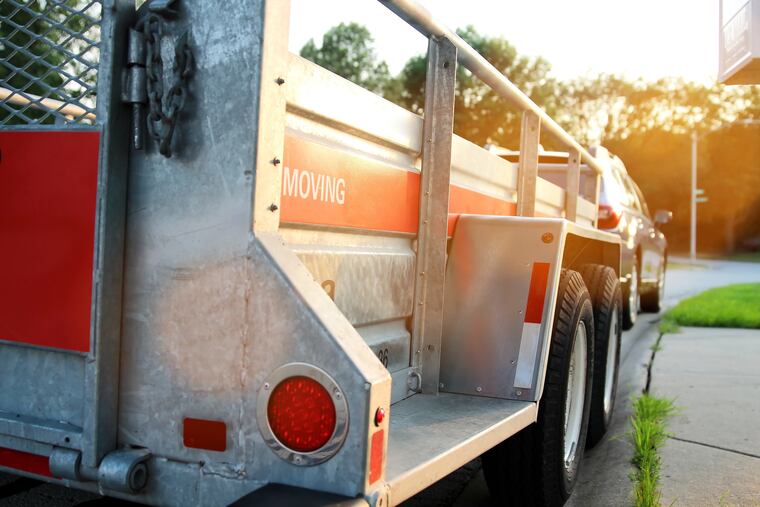Looking for movers? Here’s how to find the best deals and most reliable moving companies.
Checkbook’s ratings of local moving companies can help consumers find the best movers for them.

“Where did they find these guys?!”
It’s a question many people ask when they have a particularly good or bad experience with a moving company.
After all, choosing the right company is the most important step for a successful move, according to nonprofit Delaware Valley Consumers’ Checkbook.
One tip: Checkbook’s ratings of local moving companies can help consumers find the best movers for them. (Through a special arrangement, Inquirer readers can access Checkbook’s ratings of area moving companies for free through July 5 by visiting Checkbook.org/Inquirer/movers.)
Here’s what else to know when you’re shopping around for a moving company:
What do you need help with?
Think first about what services you need.
You’ll save a lot of money by packing your own stuff. On most local moves, paying a moving company to do all the packing doubles your costs. You can save by transporting your own boxes and other small items, including jewelry, framed art, and other especially valuable belongings, which account for a substantial amount of the weight and expense of a move. Then, let a mover handle the furniture, piano, and other hard-to-move items.
» READ MORE: Best-rated movers in the Philadelphia region, and tips for a smooth moving experience
Shop around
Be sure to get prices from several companies. Estimates should detail the services to be performed and include an inventory of items to be moved. Otherwise, you may get into a dispute on moving day with a mover who wants to charge extra for work you thought the estimate included.
Checkbook’s undercover shoppers collected prices for two local moves and three hypothetical long-distance moves, and for each job found dramatic company-to-company price differences. For example, prices quoted to move the contents of a four-bedroom house from Lansdale to Collegeville ranged from $1,600 or less to $4,680. And to move 9,000 pounds of goods 760 miles from Bryn Mawr to Chicago, Checkbook’s shoppers were quoted prices ranging from $6,500 to $12,000.
For local moves, companies usually calculate prices using an hourly labor rate for packing, loading, transit time, and unloading, plus costs to supply any containers or boxes.
Most companies, if asked, will offer estimates with caps — you won’t pay more than the cap, and you’ll pay less if it takes less time than estimated. Checkbook strongly recommends getting a capped estimate for both local and long-distance moves. Otherwise, the company may purposely work slowly, and you’ll pay more than estimated. Also, without a binding price from each company, you lack a sound basis for comparing prices.
For long-distance moves, instead of charging by the hour, companies must calculate their prices using a formula that takes into account distance and the weight of belongings. For the move itself, companies should provide you with binding estimates or estimates with a binding maximum.
Long-distance movers also charge for extras, such as for packing, cartons, storage, extra stops, and waiting time.
Storage needs
If you need storage services, or if your goods will be placed into storage during a long-distance move, get quotes for it, and be sure you have documents indicating where the goods will be stored. If possible, inspect the storage facility.
Also, make sure the company you hire for storage has insurance that will cover your belongings against theft, fire, and other risks. Insurance for goods in transit won’t cover them during long-term storage.
» READ MORE: Stash your extra stuff at Philly-area self-storage businesses, at the right price
What to do during your move
During your move, be present and attentive when your belongings are loaded and unloaded. Make sure the moving company prepares an inventory of your belongings. Carefully read the bill of lading (moving contract) before you sign it. Later, as your goods are unloaded, check the condition of each item. Focus on inspecting cartons containing especially fragile or valuable items. Don’t sign the inventory or anything else without first noting any damage that has occurred. Signing a document that does not note damage will make it hard to collect for damage later.
If you find damage after the movers leave, notify the company promptly and keep the broken items and packing materials as you found them in the box, so the mover’s claims representative can check them.
Beware of brokers
Finally, when shopping for a mover beware of brokers. If you do an internet search for “local movers” or “best movers,” many of the listings will be for brokers posing as local outfits. These middlemen usually do not own or operate any trucks or employ movers; they simply collect a deposit and sell your job to a moving company, which does the work. Because the broker chooses the mover, you may get stuck with an inferior company. And because the broker typically collects its fee up front, it may be uninterested in mediating disputes with the mover. Plus, brokers sometimes can’t find moving companies to handle jobs they’ve taken on, leaving customers scrambling.
The Federal Motor Carrier Safety Administration warns that some brokers mainly work with unlicensed or otherwise disreputable moving companies. Consumer agencies receive high numbers of complaints about brokers, many filed by customers who got stuck with rogue movers that refused to honor price estimates.
Delaware Valley Consumers’ Checkbook magazine and Checkbook.org is a nonprofit organization with a mission to help consumers get the best service and lowest prices. We are supported by consumers and take no money from the service providers we evaluate.